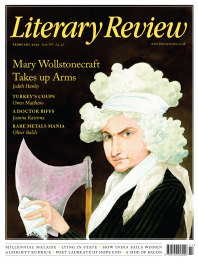Adrian Tinniswood
So Many Little Worlds
London and the 17th Century: The Making of the World’s Greatest City
By Margarette Lincoln
Yale University Press 372pp £25
Margarette Lincoln has chosen her subject well. The 17th century is the most incident-packed period in the history of England, never mind London. Beginning with an attempt to blow up James I and ending with the Glorious Revolution and an aesthetic and scientific renaissance, it saw a series of vicious civil wars, the establishment of a godly republic, the execution of one king and the deposing of another, a plague that killed a fifth of the capital’s population and a fire that destroyed its religious and commercial centre along with most of its housing. It is quite a story.
Lincoln romps through a history of London during this period, taking in everything from coffee-house culture and Catholicism to interior decoration and immigration. She is particularly good on London’s developing cosmopolitanism under the Stuarts. The capital was home to a growing black population, made up largely of seamen and servants.

Sign Up to our newsletter
Receive free articles, highlights from the archive, news, details of prizes, and much more.@Lit_Review
Follow Literary Review on Twitter
Twitter Feed
Margaret Atwood has become a cultural weathervane, blamed for predicting dystopia and celebrated for resisting it. Yet her ‘memoir of sorts’ reveals a more complicated, playful figure.
@sophieolive introduces us to a young Peggy.
Sophie Oliver - Ms Fixit’s Characteristics
Sophie Oliver: Ms Fixit’s Characteristics - Book of Lives: A Memoir of Sorts by Margaret Atwood
literaryreview.co.uk
For a writer so ubiquitous, George Orwell remains curiously elusive. His voice is lost, his image scarce; all that survives is the prose, and the interpretations built upon it.
@Dorianlynskey wonders what is to be done.
Dorian Lynskey - Doublethink & Doubt
Dorian Lynskey: Doublethink & Doubt - Orwell: 2+2=5 by Raoul Peck (dir); George Orwell: Life and Legacy by Robert Colls
literaryreview.co.uk
The court of Henry VIII is easy to envision thanks to Hans Holbein the Younger’s portraits: the bearded king, Anne of Cleves in red and gold, Thomas Cromwell demure in black.
Peter Marshall paints a picture of the artist himself.
Peter Marshall - Varnish & Virtue
Peter Marshall: Varnish & Virtue - Holbein: Renaissance Master by Elizabeth Goldring
literaryreview.co.uk